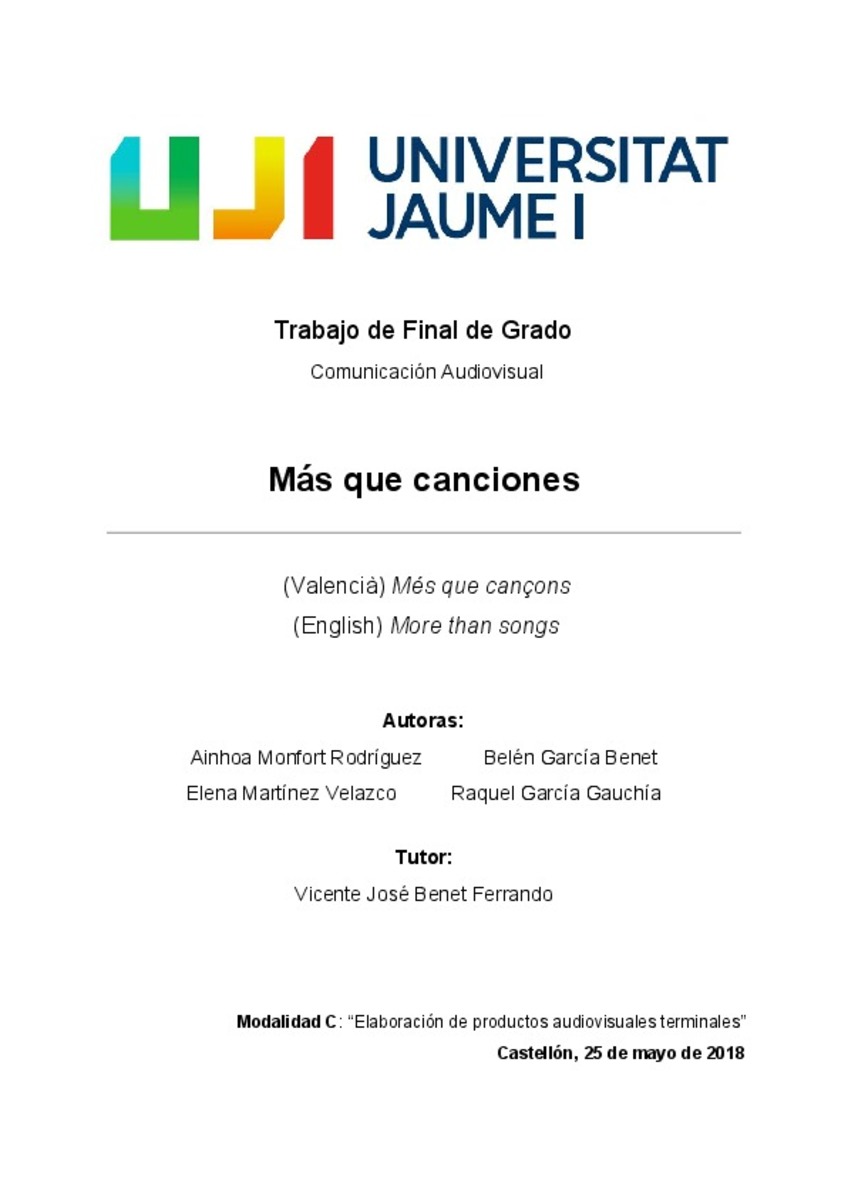Mostrar el registro sencillo del ítem
Más que canciones
| dc.contributor.author | Monfort Rodríguez, Ainhoa | |
| dc.contributor.author | García Benet, Belén | |
| dc.contributor.author | Martínez Velasco, Elena | |
| dc.contributor.author | García Gauchía, Raquel | |
| dc.contributor.other | Benet Ferrando, Vicente José | |
| dc.contributor.other | Universitat Jaume I. Departament de Ciències de la Comunicació, / | |
| dc.date.accessioned | 2018-06-21T18:44:01Z | |
| dc.date.available | 2018-06-21T18:44:01Z | |
| dc.date.issued | 2018-06-04 | |
| dc.identifier.uri | http://hdl.handle.net/10234/175289 | |
| dc.description | Treball Final de Grau en Comunicació Audiovisual. Codi: CA0932. Curs acadèmic: 2017-2018 | ca_CA |
| dc.description.abstract | Más que canciones es una película documental en la que se cuenta la historia de Laura, una compositora que trabaja para la empresa Canciona. Esta compañía se dedica a hacer canciones personalizadas por encargo. Sus trabajadores están repartidos en toda España. Así pues, Laura tendrá por fin la oportunidad de conocer a sus compañeros en persona y de tocar en directo una de sus composiciones. Se trata de un tema que cuenta una historia humana actual, novedosa y atractiva, que trabaja sobre la realidad desde un punto de vista personal, contando la historia de Laura en primera persona. Además, trata sobre la música, elemento con una enorme capacidad de transmitir emociones y unir a las personas. Los objetivos principales de este trabajo, por tanto, podrían agruparse en dos categorías. La primera: mostrar los conocimientos adquiridos durante la carrera, resolviendo problemas y utilizando los recursos disponibles para obtener un resultado óptimo. La segunda: conseguir transformar un hecho real en una historia que sea de interés y atractiva. Tras estudiar el tema y elaborar un marco teórico, podemos resaltar varios aspectos clave: la volatilidad del guion documental, en un primer lugar; la importancia de una buena documentación, investigación y planificación, por otro; las reuniones de equipo como elemento fundamental para controlar el proceso de producción al máximo posible, por otro. En base a todo esto, se argumentó la decisión discursiva del documental, con una estructura de planteamiento-nudo-desenlace, con la figura de Laura como hilo conductor, narradores homodiegéticos e intradiegéticos y el elemento clave (la actuación) grabado en riguroso directo. La valoración última del proceso de grabación ha sido favorable, ya que aunque ha habido inconvenientes y factores fuera del control del equipo de la producción, se ha tratado de controlar al máximo todos los factores posibles, y se ha dado solución a todas las pequeñas (o grandes) y a veces inevitables trabas que surgen durante el trabajo. | ca_CA |
| dc.description.abstract | Más que canciones is a documentary film in which the story of Laura, a composer who works for the company Canciona, is told. That company is dedicated to making custom songs on request. Its workers are spread throughout Spain. Thus, Laura will finally have the opportunity to meet her colleagues in person and to play one of her compositions live. It’s a theme that tells a current human story, new and attractive, that works with reality from a personal point of view, telling the story of Laura in first person. In addition, it is about music, an element with an enormous capacity to transmit emotions and unite people. The main objectives of this work, therefore, could be grouped into two big categories. The first: show the knowledge acquired during the race, solving problems and using the available resources to obtain an optimal result. The second: to transform a real event into a story that is interesting and attractive. After studying the topic and elaborating a theoretical framework, we can highlight several key aspects: the volatility of the documentary script, in the first place; the importance of a good documentation process, research and planning, on the other; team meetings as a fundamental element to control the production process as much as possible, on the other. The discursive decision of the documentary was argued, with a structure of approach-node-outcome, with the figure of Laura as the guiding thread, the presence of homodiegetic and intradiegetic narrators and the key element (the performance) recorded in rigorous direct. The last assessment of the recording process has been favorable, because even though there have been problems and factors beyond the control of the production team, we have tried to control all the possible factors as much as possible, and we have solved all the small (and the big) and sometimes inevitable obstacles that have arisen during work. | ca_CA |
| dc.format.extent | 151 p. | ca_CA |
| dc.format.mimetype | application/pdf | ca_CA |
| dc.language.iso | spa | ca_CA |
| dc.publisher | Universitat Jaume I | ca_CA |
| dc.rights | Atribución-CompartirIgual 4.0 Internacional | * |
| dc.rights.uri | http://creativecommons.org/licenses/by-sa/4.0/ | * |
| dc.subject | Grau en Comunicació Audiovisual | ca_CA |
| dc.subject | Grado en Comunicación Audiovisual | ca_CA |
| dc.subject | Bachelor's Degree in Audiovisual Communication | ca_CA |
| dc.subject | documental | ca_CA |
| dc.subject | música | ca_CA |
| dc.subject | composición | ca_CA |
| dc.subject | empresa | ca_CA |
| dc.subject | canciones | ca_CA |
| dc.subject | Canciona | ca_CA |
| dc.subject | documentary | ca_CA |
| dc.subject | music | ca_CA |
| dc.subject | composition | ca_CA |
| dc.subject | company | ca_CA |
| dc.subject | songs | ca_CA |
| dc.title | Más que canciones | ca_CA |
| dc.title.alternative | Més que cançons | ca_CA |
| dc.title.alternative | More than songs | ca_CA |
| dc.type | info:eu-repo/semantics/bachelorThesis | ca_CA |
| dc.educationLevel | Estudios de Grado | ca_CA |
| dc.rights.accessRights | info:eu-repo/semantics/openAccess | ca_CA |
Ficheros en el ítem
Este ítem aparece en la(s) siguiente(s) colección(ones)
-
Grau en Comunicació Audiovisual [390]
CA0932








